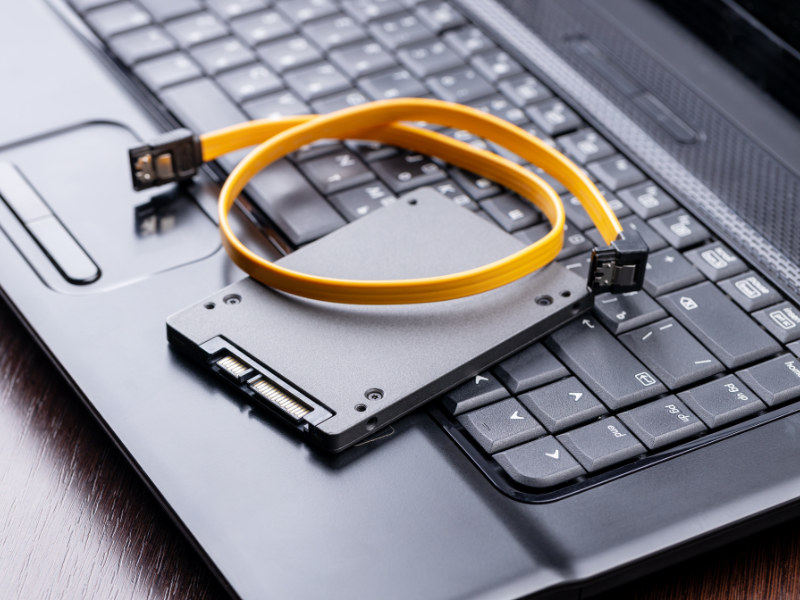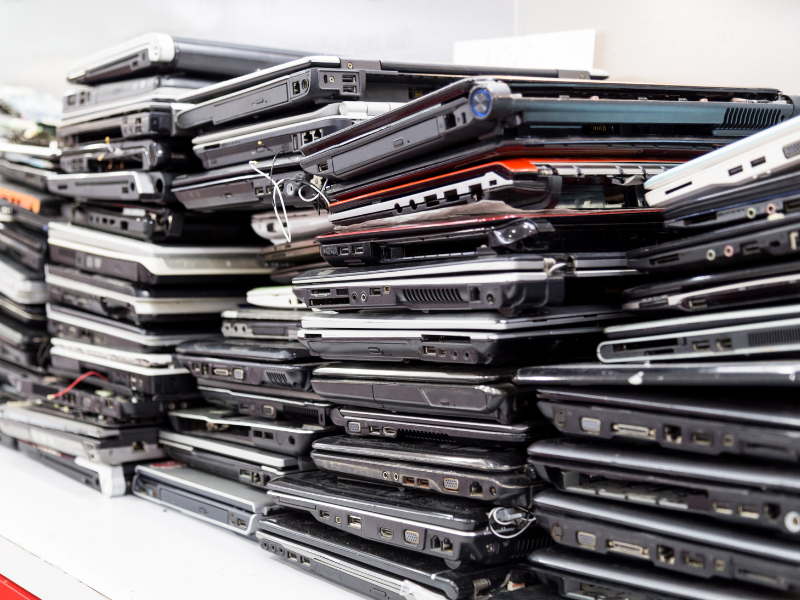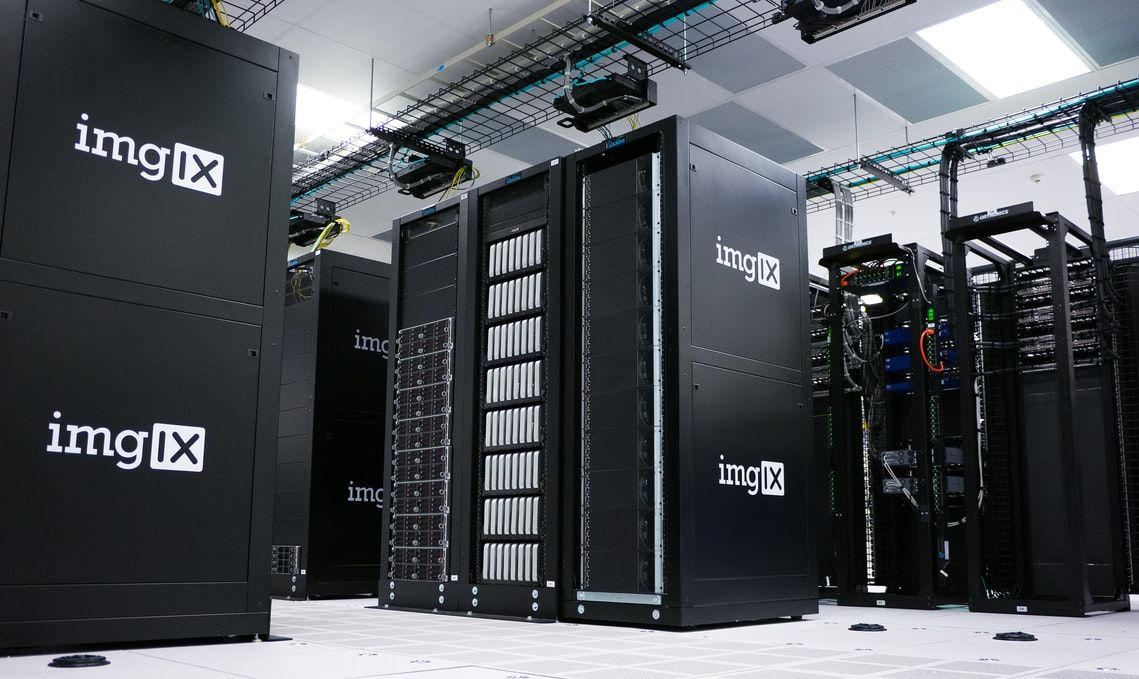How to Dispose of Old Business Laptops (2023)
By Chris Keenan
When the time arrives to dispose of your company’s old laptops, your options can be summarised as follows:
- Recycle your old business laptops and save the planet.
- Sell your old laptops and save some money.
- Donate your old laptops and save someone else some money.
- Destroy your old work laptops and save your sanity by not worrying about data protection laws.
All four options have their upsides, But which method is right for you and your business? We’ll delve deeper into how to dispose of old laptops for your company. By the end of this article, you should be able to choose which is right for you.
but listed below is what you can honestly expect from each method of laptop disposal.
Recycling your old business laptops
Pick up your pickax and dust off your mining equipment because “there’s gold in ‘em’ laptops!” That’s right, your old laptop has gold, silver, copper, aluminum, and other high-value metals. In fact, just about everything in a laptop can be reclaimed, which means the laptop is one of the few consumer electronics that is truly 100% recyclable.
Before you start demanding money from your recycler, you should first understand the process for extracting those prize nuggets of laptop gold. First, how much gold is actually in a laptop? According to Dell, a laptop computer can contain between $25 and $35 worth of gold.
Here’s the problem: to get the gold, you need to dissolve the circuit boards in acid and then extract the gold using a vat of cyanide! Just in case you’ve never seen a Sherlock Holmes movie, cyanide is so deadly it will kill you in just a few minutes. After all that nasty business, the metals are separated using a process of electrolysis, which uses massive amounts of electrical energy. Taking into account the expense of collection, de-manufacturing, and data destruction, that $30 gold nugget doesn’t come close to covering the costs of recycling a laptop.
Don’t worry, all is not lost. The term used for making recycling profitable goes by the rather fun name of ‘urban mining’. The only way to make money from urban mining is to recycle thousands of laptops at a time. So, if your company wants to recycle its old laptops, then it should do so with the view to saving the planet and not saving a buck or two.
Here’s the good news: NewTech Recycling is an ITAD company that manages to make urban mining work to the point where they will recycle your laptops for free! So, if you are out to save the planet give them a call: 732-564-3110.

Selling your old corporate laptops
If you have your heart set on making money from your old company laptops, then you might want to consider reselling them (if they still work). Finding someone to buy old company laptops is relatively easy. However, before you take the first offer, you should know your options and learn the lingo.
First, the two keywords for selling laptops are refurbished and remarketed. If you want to get as much as possible for your old laptop, it might be worth having it refurbished. A laptop refurbishment might be nothing more than a clean or could be as complex as upgrading the OS, adding a new battery and even replacing the hard drive and ram.
In some cases, a well-refurbished laptop can increase market value by as much as 300%. This leads us nicely to the second term: “remarketed”. Remarketing is all about the market you wish to sell your old laptops in. Some laptop resellers utilize e-commerce platforms, others have their own network of sellers.
Sadly, by the time you’ve factored in the cost of a refurbishment and the reseller’s marketing fees, your profits from reselling old laptops amount to a rather thin bundle of notes. That’s why one of the best approaches is to have a recycler refurbish and remarket your old laptops and use the proceeds to count against any other recycling costs you may have, like data destruction (hard drive wipe and shred). In that way, the recycler takes on the burden, leaving you to simply enjoy the profits or savings.
A word of warning: Laptops are still subject to data protection laws, so it’s probably a good idea to have the hard drives replaced and ensure the old drives are shredded.
Donating your old business laptops
When it comes to methods of how to dispose of old laptops, donation sounds like the nicest option, but it isn’t the best. This may sound a little bit ungrateful, but if you are donating laptops that only have a short life span left in them, you’re effectively giving the charity a disposal problem of their own. Donating laptops to a charity is a noble thing to do, especially if those laptops are running the latest software, have at least 24 months left in the battery, and are WIFI enabled.
However, please remember that even charities have to pay to have their old laptops collected, not to mention data destruction services and recycling. If you have your heart set on donating old laptops, then it’s usually a good idea to find an e-waste recycler that works especially with charities as they usually bundle into the offer a free recycling deal. This means that when the day comes and the laptop dies, the charity will not have to pay.

Destroying your old company laptops
If your old corporate laptops have been used to process, store, or carry any form of personal data, then you should not take any risks and have the hard drives destroyed. The protection of data associated with US citizens is regulated by laws enacted on both the national and state levels. If an old laptop hard drive is found with personal information that has not been destroyed, then at best you could be looking at a fine. At worst, failure to destroy sensitive data can result in a prison sentence.
Most large corporations run a data protection policy that takes no risks. When old laptops need to be replaced, working or not, they are simply destroyed and the materials recycled. Remember that a laptop is classified as e-waste so you can’t crush or shred a laptop and then dump it. A laptop must be demanufactured (taken apart and separated into materials) and its hard drive removed and shredded. The shredding ensures that all data, no matter how sensitive or trivial, is permanently destroyed.
How to Dispose of Old Laptops with Newtech Recycling
No matter what you decide to do with your old laptops, Newtech Recycling can help. If you’re a business with more old laptops and other electronic devices than you know what to do with, we can recycle, refurbish/remarket, and destroy your old company laptops from our R2-certified Recycling Center in New Jersey.
Ready to learn how to dispose of old laptops correctly, ethically, and legally? Contact NewTech Recycling today: 732-564-3110.
Need to Retire Specialty Equipment?
By Joel Ihnotic
As the years go by and waste streams change, its important that recyclers are flexible and meet the needs of their clients, regardless of industry or equipment they may want to recycle. The issue is that office managers do not like to work with multiple vendors to handle the array of unused, broken or old equipment that eats up office and facility space. Pick-up and processing fees can be very expensive, especially if you are paying four or five different "specialty" recyclers or disposal providers.
When looking for a vendor, it is important to find someone who can handle all of your recycling needs and be flexible to offer a solution for disposal of different equipment. Look no further than Newtech Recycling! We are excited to announce our ability to properly handle "specialty" equipment most businesses wouldn't otherwise know what to do with. Given our commitment to the recycling industry and our dedication to our clients, expanding our scope of acceptable items is a reality we happily welcome. As our network of clients such as: medical, pharmaceutical, scientific, engineering and transportation partners grow, so has the demand to evolve and fill this service gap.
Its not just about computers, printers and phones anymore. We know that almost every medical office has an old X-ray machine or centrifuge that needs to go. We understand that laboratories can get inundated with "specialty" equipment that has high turnover. We also know that the engineering and transportation industries experience similar issues with having to safely dispose of equipment that requires stringent tracking and accountability.
As a fully certified recycler, Newtech has taken the proper steps to fulfill and maintain compliance obligations across a wide spectrum. Whether its HIPAA, SOX, GLBA, FACTA, FISMA, FERPA....etc, our clients are covered.
In addition to comprehensive protection, Newtech services also come complete with another value added bonus. Each and everyone of our recycling teams provide a White Glove treatment at each service stop. This means that Newtech personnel handles the physical removal, inventory, palatalization, shrink-wrapping, loading, safe transport, unloading and weighing of all collected equipment. Relieving our clients of these typically burdening, timely and unsafe steps is always appreciated and we are happy to do it.
Going above and beyond just equipment! It is important also to know that Newtech offers a Corporate Clean Out program for unwanted furniture, panels, chairs, and miscellaneous items.
Call Newtech today for all of your “Specialty” Needs! We look forward to exceeding your expectations 732-564-3110.
Where Should You Go to Recycle Company IT Assets?
By Chris Keenan
Can you remember what happened to the IT manager responsible for the disposal of IT assets from the medical insurance company Affinity Health Plan? Alternatively, can you remember what happened to the IT manager responsible for the disposal of IT assets used by the Police Sex Crimes Division in Buffalo, N.Y.? If you cannot recall either story then allow me to jog your memory.
A few years ago an investigative journalist went around visiting IT asset recycling companies. He took with him a wallet stuffed with about $1200 and an IT data security expert. Within a few hours they had purchased 4 retired IT assets that had been used in everyday business activities.
Within a few minutes of getting this hardware home they discovered one IT asset was from the Buffalo, N.Y. Police Sex Crimes Division. It then took just 30 more minutes to start downloading tens of thousands of police documents. The results were shocking. From the sex crimes unit there were domestic violence complaints, a list of wanted sex offenders and even a list of targets of major drug raids.
The story does not end there. The journalist and his IT security consultant then went on to find a total of 300 pages of individual medical records gathered by Affinity Health Plan, a New York insurance company, on another retired IT asset. These records included everything from drug prescriptions to blood test results and cancer diagnosis’s.
These discoveries raise two questions. First, how could the IT managers responsible for this hardware during its working life have allowed this to happen? Second, how could the IT asset disposal company have sold this hardware with sensitive data still on it?
Could it be that buying old retired hardware is a modern alternative to the old hacker practice of dumpster-diving?
We’ve all heard the terms - AAA, R2:2013, e-Stewards, NAID, HIPAA or ISO 14001 being thrown around like confetti to show how security conscious IT asset management companies are. But can you really trust any of these badges? It is a serious question because if you are responsible for disposing of your company’s old IT assets and you make the wrong choice then you could be off to prison. Seems crazy doesn’t it, but the chain of responsibility ends with you. That is why you must always ask for your IT recycler to provide you with certification that proves they will correctly dispose of your IT assets.
NewTech Recycling Inc. offers fully itemized audits of the IT assets you want recycled or re-marketed (resold) to ensure that you and your company are protected from prosecution. Newtech also offer data destruction services that provide the serial numbers of each hard drive destroyed. The one thing you can be assured of is Newtech’s integrity. Newtech prides itself on a professional, compliant and supportive turnkey IT asset recycling service.
For more information call: 732-564-3110 or visit: NewtechRecycling.com
How to Recycle Business and Office Computers?
By Chris Keenan
Back in the olden days of the typewriter a middle-sized company could find itself producing tens of thousands of paper documents over the course of a trading year. Accounting reports, receipts and invoices usually needed to be held in storage for years to comply with various laws and regulations. Many other documents also found their way into the archives, such as contracts, letters and even simple memos. These archives would often grow to the point that they needed to be shipped off to warehouses so that the company could continue to do business without employees being impeded by the racks and boxes that housed the historic company records.
Then along came the server and its digital hard drive. A typical modern 1TB hard drive can permanently store 60 million A4 sized letters. If all those documents were printed then you would have a wad of paper more than 4 miles thick. It is no wonder that the business community jumped at the chance to leave behind their costly paper archive storage in favor of a less costly single room in their office filled with servers for digital archive storage.
It seems that we’ve now gone full circle and that many businesses have gone back to using massive warehouses to store their data. The big change is that these warehouses now have racks of servers and hard drive pods instead of racks of boxes filled with paper. It is not known exactly how many servers there are in the world, but data centers range in size from 50,000 servers to as many as 80,000 servers. It’s thought that Google & Facebook alone have millions of servers running 24 hours every day.
Relocating a server room to a shared data center can save a company thousands of dollars. With this saving in mind there are far fewer SME’s today that host servers on their own premises. You might think this move to data centers has drastically reduced the amount of IT hardware used in an office - but you’d be wrong. It turns out the amount of computer equipment used in the work place has continued to increase massively!
The device most frequently found in the office today is the desktop computer. There are over 87 million desktop computers being used by the U.S. workforce right now. Most of these desktops are replaced every 3 to 4 years, which would mean on average more than 50,000 computers, along with their screens, are disposed of every day!
Newtech Recycling is one of the first organizations on the East Coast created specifically to help the business community dispose of their desktop computers. Of course, it’s not just the computer Newtech disposes of. They will manage everything, including the screens and the computer peripherals (e.g. external drives, keyboards, mice, speakers, printers, scanners, racks, etc.).
Over 25 years Newtech has learned many lessons about desktop disposal. They can be summarized in the following 5 pieces of advice for any business choosing to recycle their IT hardware:
• Always have your company hard drives removed and shredded. The liabilities around digital privacy laws are now so high that it’s not worth taking any risks, whether the hard drives have data on them or not.
• After removing and shredding the hard drive, the rest of the desktop should be de-manufactured. It is much more difficult to separate materials from shredded computers with current technology, so choosing de-manufacturing is by far the most ecologically friendly method of recycling.
• Help your recycler as much as possible by sorting cables and computer peripherals into separate boxes. E-waste is managed and sorted by hand, and with 50 thousand computers being scrapped daily any help in organizing the materials before they get to the recycling facility makes the process more effective and efficient.
• If you can afford the service then ask to have your e-waste audited by its serial numbers and instruct your recycler to provide a serialized confirmation of the items recycled. This removes you from the chain of custody and transfers liabilities to the computer recycling company. It is a document that you should keep with other important company records.
• Finally, ask to see copies of the recycler's R2 certification and any ISO or State accreditation. If a recycling company is not certified or unable to provide this level of assurance then don’t use them. You should ensure that your old office computers are recycled correctly, not just for environmental or ethical reasons but also for legal reasons.
I truly hope this article has helped, for more information about the disposal of desktop computers.





